
PRESS RELEASE
Embassy of Mexico in Canada
Ottawa, Canada, June 24, 2014
The Sixth Meeting of Honorary Consuls of Mexico was held at the headquarters of the Foreign Ministry (SRE), with the attendance of over 100 participants from 60 countries. Participants from Canada included Mexico’s Honorary Consul in Quebec City, Madeleine Therrien; the Honorary Consul in Winnipeg, James Erwin Downey; the Honorary Consul in Halifax, Nova Scotia, Galo Carrera Hurtado; and the Honorary Vice-Consul in Quebec City, Micheline Dessureault.
The meeting brought together those who perform consular duties in an honorary capacity on behalf of Mexico, as well as senior Foreign Ministry officials and representatives from federal and state governments and the private sector.
The main purpose of the meeting was to update Mexico's honorary consuls on the country's progress and challenges and the nation’s priorities for trade, tourism and culture. The meeting's agenda reflected two of the guiding principles established by President Enrique Peña Nieto at the beginning of his administration: prosperity for Mexico and Mexico as a globally responsible stakeholder.
President Enrique Peña Nieto hosted a working breakfast for Mexico’s honorary consuls at the National Palace. The Secretaries of Finance and Public Credit, Tourism, and the Economy, the Chair of the National Council for Culture and the Arts, and the CEO of ProMéxico gave presentations on their respective spheres of responsibility to the honorary consuls, who also visited the states of Estado de México and Campeche, where they met with state authorities and representatives from the business sector.
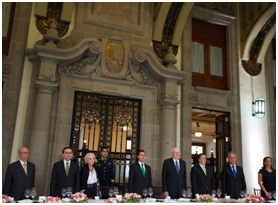
The Honorary Consul of Mexico in Quebec City, Madeleine Therrien, together with President Enrique Peña Nieto during the working breakfast hosted by the President.
Based on SRE Press Release 248 (15/06/2014)
Mexican Academy of Sciences
Press Release AMC/219/14
Mexico City, June 22, 2014
• A symposium begins today in which scientific leaders of the three countries will study new horizons for science in the fields of astrophysics, biotechnology, green chemistry, marine science and disasters
• Trade between the three countries has more than tripled and many of the economic gains can be attributed to NAFTA, however, this treaty did not foresee that science, technology transfer and innovation would play a fundamental role as key drivers of social and economic development in the world today
Academies of Sciences from Canada, the U.S. and Mexico are working to achieve the broadest possible cooperation among the three countries. As a first step, a joint symposium began today at Casa, the University of California’s mini-campus in Mexico City, involving the participation of young researchers in astrophysics, biotechnology, green chemistry, marine science, and the field of hazards and disasters. The academic session, which will conclude on June 24, consists of presentations from the next generation of scientific leaders.
The symposium entitled: New Horizons in Science, is organized by the Mexican Academy of Sciences, headed by José Franco; the Royal Society of Canada: The Academies of Arts, Humanities and Sciences of Canada, represented by Jeremy McNeil; and the National Academy of Sciences of the United States, headed by Michael T. Clegg.
According to the organizers, an important step in North American cooperation began with the Free Trade Agreement (NAFTA), which for over 20 years now has been geared toward increasing economic integration between Canada, the U.S. and Mexico. Certainly this treaty has achieved its objectives, as trade between the three countries has more than tripled from $290 billion in 1993 to more than $1.1 trillion in 2012.
While these achievements can be attributed to NAFTA, the organizers added, the treaty did not fully anticipate that science, technology transfer and innovation would play a fundamental role as the main drivers of social and economic development in the world today.
It has been estimated that over 50% of economic growth in the twentieth century can be traced to the fruits of scientific discovery. The three North American partners have strong scientific communities, and the three further benefit through close scientific cooperation that can lead to new technologies and solutions to the challenges of the 21st century.
They believe that new discoveries and inventions are powered by the open exchange of ideas and combining methods and knowledge from the various disciplines in novel, creative ways. Moreover, the challenges of the twenty-first century, such as climate change, can only be addressed with sound scientific knowledge applied at the international level.
Consequently, the academies of the three nations aim to work together to stimulate scientific exchange and focus on the next generation of scientific leaders, with the conviction that this is the most effective way to ensure a better future for each of the three countries.
The complete program can be consulted at: www.ianas.org/newhorizonsinscience/
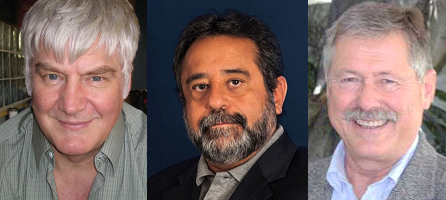
The symposium "New Horizons in Science", is organized by Jeremy McNeil, Secretary of International Affairs of the Royal Society of Canada; José Franco, President of the Mexican Academy of Sciences; and Michael T. Clegg, Foreign Secretary of the National Academy of Sciences of the United States.
Photo: IAP, AMC and UCI.

10 JUNE 2014
• Mexico’s Secretary of Labour agreed with his Canadian counterpart on the need to continue building the labour chapter of the Trans-Pacific Partnership.
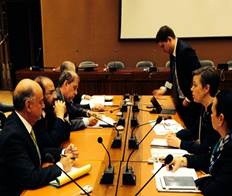 Mexico’s Secretary of Labour and Social Welfare, Alfonso Navarrete Prida, held a bilateral meeting with Canada’s Minister of Labour, Kellie Leitch, in the context of their working visit to Geneva, Switzerland, where the 103rd Session of the International Labour Conference is being held.
Mexico’s Secretary of Labour and Social Welfare, Alfonso Navarrete Prida, held a bilateral meeting with Canada’s Minister of Labour, Kellie Leitch, in the context of their working visit to Geneva, Switzerland, where the 103rd Session of the International Labour Conference is being held.
During the bilateral meeting with Canada, the head of the STPS and Minister Kellie Lietch agreed on the need to continue building the labour chapter of the Trans-Pacific Partnership (TPP). They also agreed to continue collaborating in the context of the NAALC, where cooperation will guide future actions among the US, Mexico and Canada.
In commenting on the experience of the Canada-Mexico Seasonal Agricultural Workers Program, Minister Leitch said it is a mechanism through which significant results have been produced, so program operations will continue to strengthen.
Secretary Navarrete Prida indicated that in order to give greater continuity to SAWP operations and consolidate bilateral relations to result in greater protection for migrants, the STPS will open a new representative office in Canada.
The two officials agreed to further strengthen the ties of joint cooperation and expressed their interest in meeting again in Mexico.
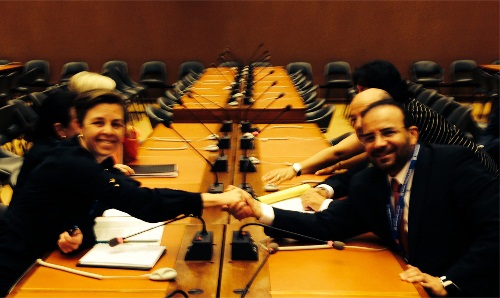
Press Release based on Informative Bulletin 243 of the STPS.
Press Release
Embassy of Mexico in Canada
Ottawa, Canada, June 20, 2014
To commemorate 40 years since the signing of the Memorandum of Understanding of the successful Seasonal Agricultural Workers Program (SAWP), the Ambassador of Mexico to Canada, Francisco Suárez Dávila, conducted a working visit to Leamington, Ontario. The locale, one of the cities with the highest concentration of seasonal agricultural workers, houses the Mexican Consulate that was opened in 2005 to offer consular assistance to the roughly 3,000 Mexicans employed through the SAWP. 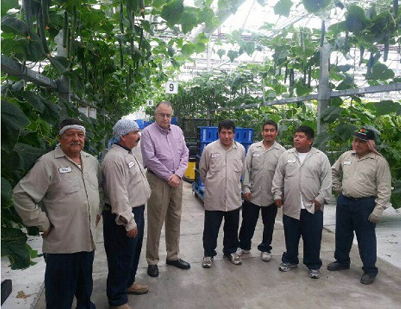 Ambassador Suárez Dávila visited the tomato greenhouses of Great Northern Hydroponics and cucumber greenhouses of 1329606 Ontario LTD, where he met with the owners to exchange views on the program’s operations and discuss proposals to improve its performance, particularly in regard to labour security, housing conditions and access to health services for the workers. He also spent some time with the Mexican agricultural workers to learn about their employment conditions and their perceptions of the program.
Ambassador Suárez Dávila visited the tomato greenhouses of Great Northern Hydroponics and cucumber greenhouses of 1329606 Ontario LTD, where he met with the owners to exchange views on the program’s operations and discuss proposals to improve its performance, particularly in regard to labour security, housing conditions and access to health services for the workers. He also spent some time with the Mexican agricultural workers to learn about their employment conditions and their perceptions of the program.
During his visit, the Ambassador was accompanied by Minister Eusebio del Cueto, Consul of Mexico in Leamington, as well as consular and protection personnel from the Consulate, with whom he also held an extensive meeting to work on various topics and evaluate the program in that constituency.
The SAWP began with 203 workers in 1974 and has grown every year to reach a record high of 18,501 workers in 2013, working on 1,684 farms in nine provinces of Canada. Half of the Mexican seasonal agricultural workers are situated in Ontario, with a large part of them in Leamington; 20% of all workers are in British Columbia and 20% in Quebec, and the remaining 10% are distributed among provinces of Alberta, Manitoba, Prince Edward Island, Saskatchewan, Nova Scotia and New Brunswick. The main crops in which Mexican agricultural workers are employed are vegetables and legumes (38% of the total), fruits (26.5% of the total) and flowers (6.6% of the total)
The SAWP has become an exemplary circular labour mobility program whose success lies in ensuring a safe, orderly and legal migration. It provides Canada with the possibility of meeting labour needs while Mexican families benefit by obtaining secure employment that provides them with a satisfactory income.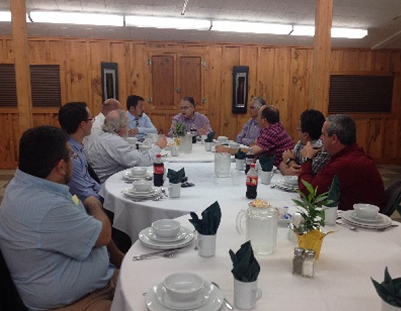 In an effort to improve working conditions for Mexicans participating in the program, the governments of Mexico and Canada hold annual meetings to assess the program and propose improvements to it. One result of these efforts has been to establish a system for workers to evaluate their employers.
In an effort to improve working conditions for Mexicans participating in the program, the governments of Mexico and Canada hold annual meetings to assess the program and propose improvements to it. One result of these efforts has been to establish a system for workers to evaluate their employers.
The government is seizing the opportunity provided by commemorating 40 years of the Seasonal Agricultural Workers Program to reaffirm its commitment to defending the rights of Mexicans in the program and promoting institutional arrangements that ensure safe, orderly, and legal migration.
Press Release
Ottawa, Canada, June 4, 2014
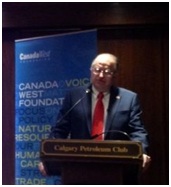 On June 2, the Ambassador of Mexico to Canada, Francisco Suárez Dávila, participated as a speaker in the seminar “Opportunities for Western Canada in Mexico’s Energy Reform”, offered by the Canada West Foundation. The event, which was held at the Calgary Petroleum Club, aimed to highlight the main elements of the Energy Reform and investment opportunities available to the Canadian energy sector. The seminar, which was covered extensively by local and national media, was attended by business leaders, government officials and academics specializing in energy.
On June 2, the Ambassador of Mexico to Canada, Francisco Suárez Dávila, participated as a speaker in the seminar “Opportunities for Western Canada in Mexico’s Energy Reform”, offered by the Canada West Foundation. The event, which was held at the Calgary Petroleum Club, aimed to highlight the main elements of the Energy Reform and investment opportunities available to the Canadian energy sector. The seminar, which was covered extensively by local and national media, was attended by business leaders, government officials and academics specializing in energy.
In addition to the Ambassador, the Mexican government delegation participating in the seminar included the Undersecretary of Planning and Transition from the Secretariat of Energy, Leonardo Beltrán, and the Director General of Energy and Extractive Activities from SEMARNAT, Galo Galeana. Other speakers at the event included the Executive President of the consulting firm EnergeA StructurA, Dr. Jesús Reyes Heroles, the Vice President of Grupo Alfa, and representatives from the Mexican Competitiveness Institute.
On June 3, Undersecretary Beltrán and the Ambassador participated in a briefing session coordinated by the Mexican Consulate in Calgary, at the University of Calgary’s School of Public Policy. In addition to the Mexican officials, presentations were given by representatives of the National Energy Board and Alberta Energy Regulators, regulatory bodies in the energy sector at the federal and provincial levels, the energy engineering company K’nowbe Knowledge and the geological data firm Canadian Discovery. During the session the government departments and Canadian companies shared best practices in regulatory matters and technical training.
In order to increase cooperation and academic exchange with Alberta, the Mexican delegation also met with the Vice-Provost - International at the University of Calgary, Janaka Ruwanpura. Participants in the meeting agreed to work towards establishing a Mexico Chair, as well as other mechanisms of exchange among researchers and experts on energy issues.

For further information on the Canada West Foundation seminar, please visit the organization’s website at http://cwf.ca/ or review the media coverage of the event:
- Mexico looks for Alberta energy expertise as monopoly ends. CBC News Calgary.
- Mexico energy reform & opportunities for Canada to invest. BNN. Interview with former Secretary of Energy, Jesús Reyes Heroles.
- Mexico to spend nearly $300B on oil & gas in next 4 years. BNN. Interview with the Undersecretary of Planning and Transition at the Secretariat of Energy, Leonardo Beltrán.
- What Canada can gain from working closer with Mexico. BNN. Interview with Mike Cleland from the Canada West Foundation.
- Mexico, Canada talk oil deals. National Post. Claudia Cattaneo, p.FP1.
- Mexico pitches newly reformed energy sector for Canadian investment. The Canadian Press. Lauren Krugel (Calgary Herald, p.C5)
- Mexico courts energy investment. Edmonton Journal, p.D2.

